 Petzlover
Petzlover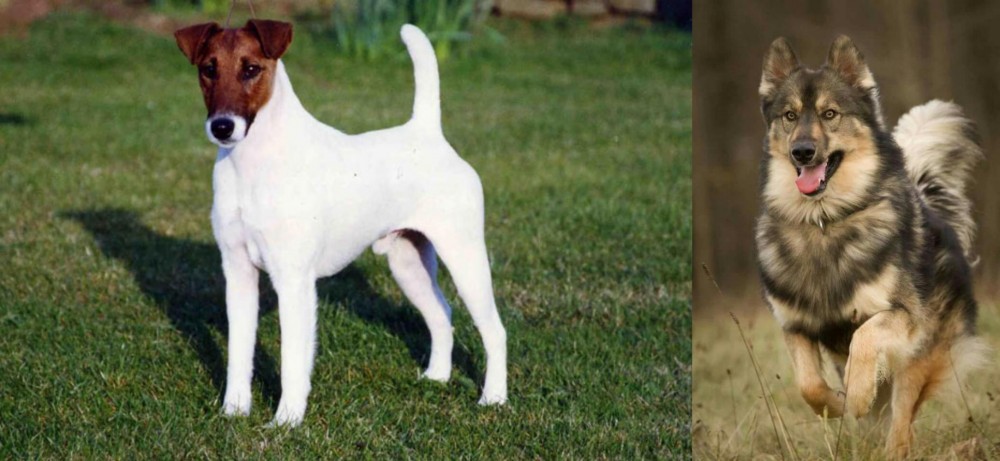 Fox Terrier (Smooth) is originated from United Kingdom but Native American Indian Dog is originated from United States. Fox Terrier (Smooth) may grow 7 cm / 3 inches higher than Native American Indian Dog. Fox Terrier (Smooth) may weigh 111 kg / 244 pounds lesser than Native American Indian Dog. Fox Terrier (Smooth) may live 4 years less than Native American Indian Dog. Both Fox Terrier (Smooth) and Native American Indian Dog has almost same litter size. Fox Terrier (Smooth) requires Moderate Maintenance. But Native American Indian Dog requires High Maintenance
Fox Terrier (Smooth) is originated from United Kingdom but Native American Indian Dog is originated from United States. Fox Terrier (Smooth) may grow 7 cm / 3 inches higher than Native American Indian Dog. Fox Terrier (Smooth) may weigh 111 kg / 244 pounds lesser than Native American Indian Dog. Fox Terrier (Smooth) may live 4 years less than Native American Indian Dog. Both Fox Terrier (Smooth) and Native American Indian Dog has almost same litter size. Fox Terrier (Smooth) requires Moderate Maintenance. But Native American Indian Dog requires High Maintenance
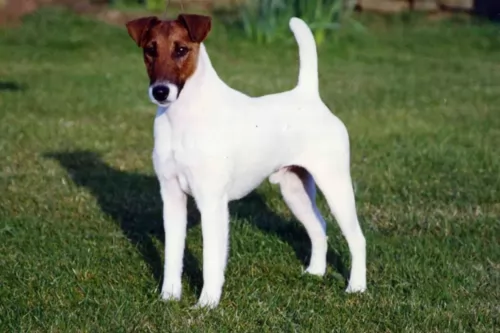 The Smooth Fox Terrier is one of two Fox Terrier breeds, the other being the Wirehaired Fox Terrier. Fox Terriers are believed to be one of the oldest terrier breeds and the ancestor of many terriers who came after. The Fox Terrier was recognized by the American Kennel Club in 1885 and the smooth Fox Terrier as a separate breed 100 years later in 1985. Some clubs still consider the two types of Fox Terriers as the same breed. The standard for smooth Fox Terrier was written in 1876 but not accepted until 1985.
The Smooth Fox Terrier is one of two Fox Terrier breeds, the other being the Wirehaired Fox Terrier. Fox Terriers are believed to be one of the oldest terrier breeds and the ancestor of many terriers who came after. The Fox Terrier was recognized by the American Kennel Club in 1885 and the smooth Fox Terrier as a separate breed 100 years later in 1985. Some clubs still consider the two types of Fox Terriers as the same breed. The standard for smooth Fox Terrier was written in 1876 but not accepted until 1985.
Both breeds of Fox Terriers are thought to originate in the late 1800’s descended from various British Terriers, the beagle, the dachshund and the Fox Hound. The Smooth Fox Terrier has a base coat that is white. The hunters bred them this way, so they would not mistake them for the fox during the hunt. They have also been very successful in prestigious dog shows including Crufts in England and New York Westminster in the United States.
They are not that popular today unless you are hunting and showing them in Confirmation Competitions. However, the Smooth Fox Terrier is significant because of all the terriers that consider it their direct ancestor. This would include the Jack Russel, the Rat Terrier and the Miniature Fox Terrier.
 The Native American Indian Dog is an ancient breed, that some consider to be feral. It is a landrace breed that developed with the indigenous peoples North America. These dogs originally looked and sounded like wolves and it is likely that their ancestry is tied to wolves crossed with pre-Columbian American dogs that came to the America’s with the first peoples. There are some that believe the Native American Indian Dog is a connecting line back to the dogs or wolves that over 12,000 years ago were the first to be domesticated by human beings.
The Native American Indian Dog is an ancient breed, that some consider to be feral. It is a landrace breed that developed with the indigenous peoples North America. These dogs originally looked and sounded like wolves and it is likely that their ancestry is tied to wolves crossed with pre-Columbian American dogs that came to the America’s with the first peoples. There are some that believe the Native American Indian Dog is a connecting line back to the dogs or wolves that over 12,000 years ago were the first to be domesticated by human beings.
They are now a rare breed in the wild and a small group of domesticated dogs. Fossil studies in recent years suggests that the Native American Indian Dogs came to North America about 4500 years after the first indigenous peoples. It is believed that the Native Americans bred the dogs that traders and explorers brought with them to the native coyote as well. This created a breed specific to North America and called the Common Native Dog or the Common Indian Dog. The original NAID was a mix of many different breeds of dogs and wild canines.
Today’s NAID is said to be raised on Indian reservations in the United State and represent a mix of Chinook, Husky, German Shepherd Dog and Malamute, along with perhaps some of today’s wolf mixed in. This dog is raised domestically and is socialized to life with humans. They are the last remaining breed from all the Native North American dogs that lived with the original people of the Americas. They are also thought to have an ancestry similar to the Australian Dingo.
They are a devoted, protective and loyal breed though they tend to be shy. They need to be outside for the majority of the day and don’t do well in crates. They need a fenced yard and room to roam. They are working dogs that hunted, pulled sleds and guarded their homes. They still need a job to so.
Today the North American Indian Dog is being bred to replicate the temperament and appearance of the originals. Although there are many breeders working from the founding breeder with original stock, there are only six that are officially given authorization to breed the NAID. They are registered by Terra Pines with the National Kennel Club but not recognized by the AKC and UKC.
The breed name NAID is trademarked by Karen Markel of Majestic View Kennels in the 1990’s. Today the breed is nationally recognized as a breed very much like the original Native American dogs, The breed is intelligent and quite healthy. They enjoy people and engage in many companion activities.
Whatever its true ancestry the current Native American Indian Dog (NAID), today’s version is not recognized by the AKC, but they are recognized by the Dog Registry of America, the Native American Indian Dog Registry and the National Kennel Club.
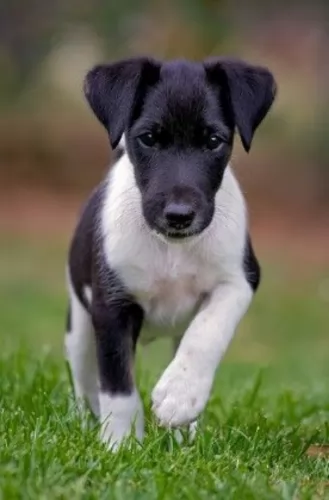 The Smooth Fox Terrier is distinguished from the Wirehaired and other terriers by his V-shaped head and white based coat. The coat can have tan, black and black and tan marks on the white coat. The Smooth Fox Terrier is sturdy, strong, sleek and symmetrical. The breed has a short back, and proportioned legs. The Smooth Fox Terrier has a flat skull and tapered muzzle. The nose is black, and the eyes are dark. He has v-shaped ears and a docked tail. Docking is no longer legal throughout the United Kingdom.
The Smooth Fox Terrier is distinguished from the Wirehaired and other terriers by his V-shaped head and white based coat. The coat can have tan, black and black and tan marks on the white coat. The Smooth Fox Terrier is sturdy, strong, sleek and symmetrical. The breed has a short back, and proportioned legs. The Smooth Fox Terrier has a flat skull and tapered muzzle. The nose is black, and the eyes are dark. He has v-shaped ears and a docked tail. Docking is no longer legal throughout the United Kingdom.
 There are two sizes of the North American Indian Dog – they are medium and large. They have dense short double coats, or they have long top coats and a fairly dense undercoat. They come in a variety of colors mostly black or silver but there is also a tortoiseshell. These tortoiseshell colored dogs are considered by Native Americans to be sacred beings. These tortoiseshell dogs are strikingly good looking and are called Spirit Dog.
There are two sizes of the North American Indian Dog – they are medium and large. They have dense short double coats, or they have long top coats and a fairly dense undercoat. They come in a variety of colors mostly black or silver but there is also a tortoiseshell. These tortoiseshell colored dogs are considered by Native Americans to be sacred beings. These tortoiseshell dogs are strikingly good looking and are called Spirit Dog.
They all have the look of a Siberian Husky or Alaskan Malamute with upright ears and almond shaped eyes that are anywhere from amber to brown with some blue. Usually their tails are down and long but can be curled. They resemble the wolf and have that wild, feral appearance. They can be as large as over one hundred pounds or average seventy to eighty pounds. They are strong, alert and intelligent. They are considered to be hypoallergenic, shedding their coat only once a year.
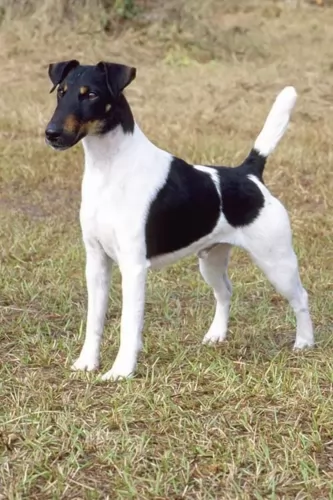 Children friendliness They shouldn’t be trusted with young children but if raised with older children ok
Children friendliness They shouldn’t be trusted with young children but if raised with older children ok
They are good at performing tricks, Search and rescue, narcotics detection, tracking, and disability assistance.
Fox Terrier is adaptable and can live anywhere. He is not a big dog but remember he is very high energy.
They have very good learning ability and are very intelligent but can be stubborn
 This breed is gentle and loving with children.
This breed is gentle and loving with children.
Endurance, strength and good health.
Low adaptability to small living spaces and lack of outside space; don’t do well in crates and need an experienced dog owner.
They are highly intelligent, love to learn and are just a little stubborn.
 One of the major problems for the Smooth Fox Terrier that the Wirehaired does not face is the potential for deafness. This is an issue in dogs that are mostly white in color. Other concerns that he does share with the Wirehaired Terrier are:
One of the major problems for the Smooth Fox Terrier that the Wirehaired does not face is the potential for deafness. This is an issue in dogs that are mostly white in color. Other concerns that he does share with the Wirehaired Terrier are:
Causes muscle weakness and problems swallowing.
 This is a fairly healthy, long lived breed having spent so much of its history in isolation. They are prone to some of the issues that affect all medium to large breeds.
This is a fairly healthy, long lived breed having spent so much of its history in isolation. They are prone to some of the issues that affect all medium to large breeds.
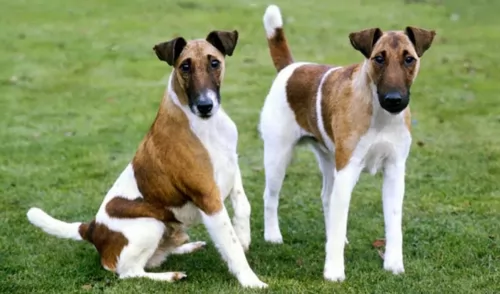 Feed 2-3 meals per day and divide 1/8-1/4 cup
Feed 2-3 meals per day and divide 1/8-1/4 cup
Feed two meals per day and divide ½ cup
hearing and vision
The Smooth Fox Terrier is an athlete requiring a lot of exercise. Take him on long walks and play with him in a large fenced yard. Don’t coup him up in the house. Be careful not to exercise him off leash as he will chase anything that moves and will not come when called. They need mental stimulation as well as physical. They are good at hunting, agility, tracking, performing tricks and being a watchdog.
 Because of their propensity to grow to quickly the puppy should only stay on puppy food for 8-10 months. Feed them a high quality large dog puppy food 3-4 times daily for a total of 2-21/2 cups per day.
Because of their propensity to grow to quickly the puppy should only stay on puppy food for 8-10 months. Feed them a high quality large dog puppy food 3-4 times daily for a total of 2-21/2 cups per day.
Feed a high protein, large dog dry food twice a day for a total of two cups. Do not over feed. Do not feed right before or after exercise do to the risk of bloat.
Healthy, strong long lived dog.
This is not an indoor, couch potato dog. They need exercise and they need space. They won’t do well as apartment dogs unless you can take them to a dog park for over an hour every day. They really need a large fenced in yard. They don’t do well in crates either. He doesn’t understand crates and thinks you are punishing him. They make great hunters, search and rescue dogs, service dogs and therapy dogs. They will succeed at pulling competitions and weight competitions.